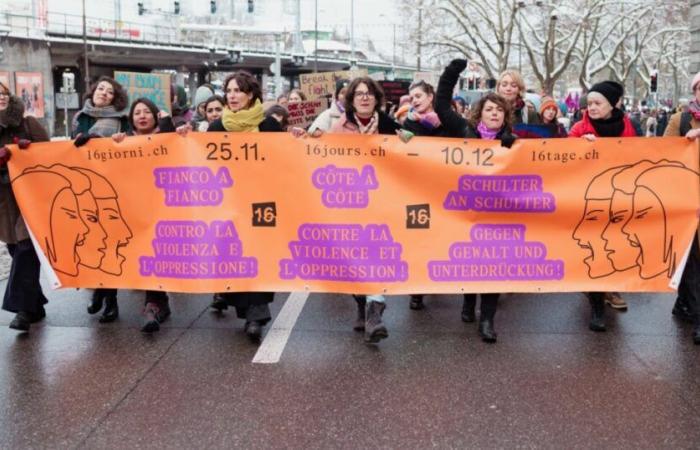There were several thousand in the freezing streets of Bern, Saturday November 23, 2024, to demonstrate their anger at the scourge of violence against women and girls which is plaguing societies in Switzerland and elsewhere. One feminicide every 10 minutes in the world, according to the UN. One approximately every two weeks in our country in 2023, according to the OFS. 18 murders of women recorded by the Stop Femizid collective in 2024. The tip of the iceberg, the most violent and the most visible.
But gender-based violence also includes rape, sexual assault, street or internet harassment, beatings in the shadows of the home, words that hurt and isolate, sexist jokes in the workplace. work. In order to fight against all forms of violence fueled by sexist and unequal social norms which primarily affect women and trans or queer people, the feminist NGO for peace Frieda, based in Bern, has been coordinating since 2008 in German-speaking Switzerland and since 2023 in all linguistic regions the national campaign “16 days against gender-based violence”.
The kick-off was given during the demonstration on November 23 in the Swiss capital, in the presence of nearly 10,000 people (according to the organizers), around ninety organizations defending women’s rights and political figures. like Tamara Funiciello (PS/BE), Mathilde Mottet (PS/VS) or even the former socialist federal councilor Simonetta Sommaruga.
Fight collectively against violence
From November 25 – International Day for the Elimination of Violence against Women – to December 10 – International Human Rights Day -, this international campaign originally launched by the American Center Women’s Global Leadership (CWGL) in 1991 contributes to reducing forms of violence through prevention and awareness, during actions and events organized throughout Switzerland by partner groups and associations. Among the demands in particular, a strengthening of financial and human resources to support victims of violence and improvement of data collection and studies to establish statistics in order to propose targeted interventions.
“The goal of this national campaign is to bring together all the people and organizations fighting against gender violence, despite language barriers, because it is everyone’s business,” underlines Isabel Vidal, head of the campaign in Switzerland. French and Italian.
Violence is deeply rooted and trivialized in our society. However, the figures remind us of the urgency: it is imperative to make gender-based violence a political priority.
While the entry into force of the Istanbul Convention in 2018 marked progress, much remains to be done. The disparities between cantons show that the effort must be strengthened.”
Response and reconstruction at the forefront
The theme of this 2024 edition is “Fight back and rebuild after violence”. “All the partners have chosen this strong theme to launch a call to action: rebuilding means offering victims the means to heal, with adapted structures and lasting support,” explains Isabel Vidal. However, today, the reconstruction process depends a lot on the canton where we live. Very often, victims of violence are subject to obstacles: for example, they may feel shame, not be believed, not be able to access the necessary support, or find themselves facing their attacker in legal proceedings, etc. Despite the remarkable work of LAVI centers, specialist services and support groups, navigating this system remains extremely difficult.”
For the organizers of the “16 days against gender-based violence” campaign, the response to violence must be collective. “Femicides can be avoided,” explains Isabel Vidal.
In many cases, acts of violence are reported before the murder. We also know that psychological violence often precedes physical violence. We must learn to recognize these actions and take them seriously.
This will allow us to act more effectively to prevent violence and support victims. Offer listening, support, maintain a connection to counter isolation – one of the first forms of violence in abusive relationships -, but also work on your own deconstruction, question your biases.”
The head of the campaign in French-speaking and Italian Switzerland insists on the fact that men are essential in the fight against sexist and sexual violence. “We need men who are vocal on this issue, even if it is a position that makes them feel insecure. Gender violence is not women’s problem.
We will only be able to move forward if those privileged under oppression also get involved.”
A French-speaking agenda to raise awareness of violence
The campaign website also serves as a calendar and many events in French-speaking Switzerland are listed there. For example, at the Collège Voltaire in Geneva, a conference will provide a better understanding of the issues and management of psychological violence in couples (November 28); at the Bistrot du Concert in Neuchâtel, Coline de Senarclens will host a “I believe you” café, a space for discussion and reflection around reconstruction (December 1); at the University of Lausanne, a round table will address the issues of response and reconstruction (December 2); while in La Chaux-de-Fonds, a collective reading will allow us to study the work of sociologist Gwenola Ricordeau on the abolition of the prison system (December 6). Finally, movie buffs are not left out, since screenings are organized in several cities.
More information on the calendar
Did you like this content? Subscribe to our newsletter to receive all our new articles!






